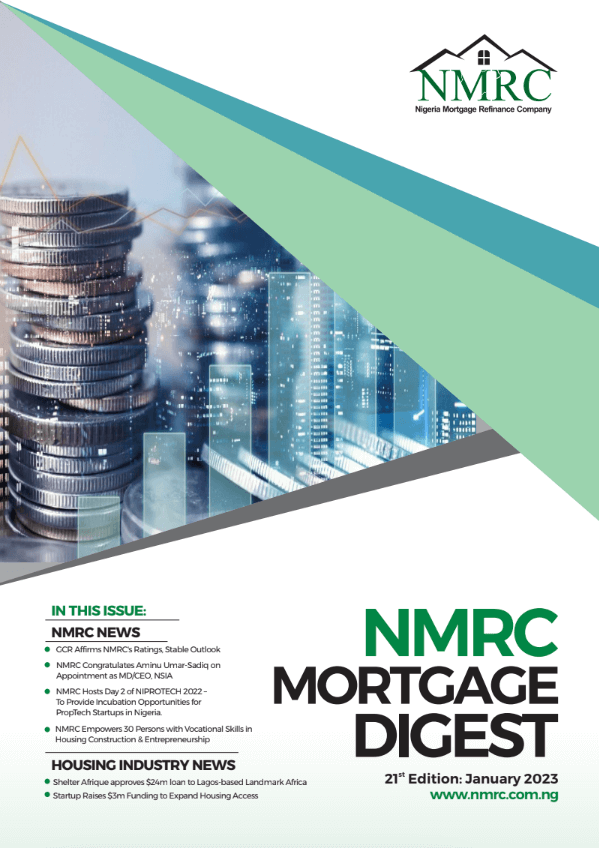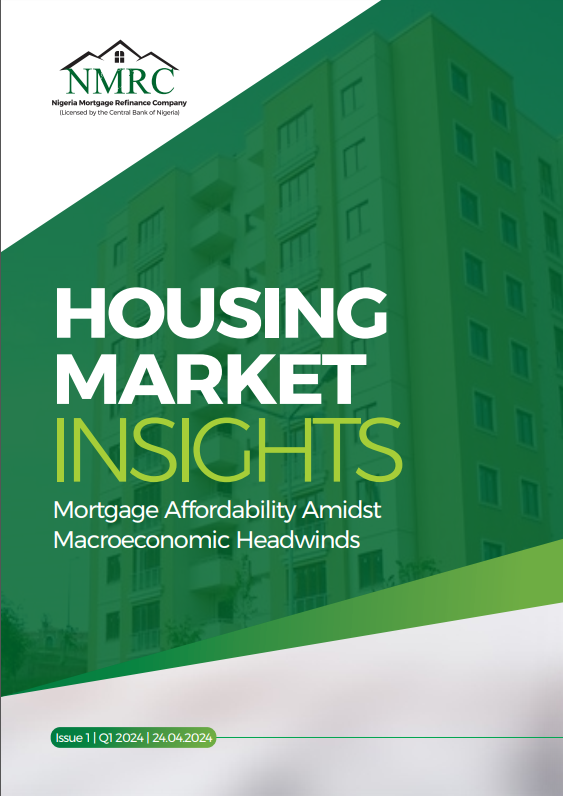If you plan to own a home through a mortgage, it is important to understand key mortgage terms. Doing so will prepare and guide you in your engagements with mortgage lending institutions. The knowledge will help you move through the homebuying process seamlessly and with confidence.
Underwriting Standards
Mortgage Underwriting standards are guidelines established to ensure that safe and secure loans are. issued and maintained. They help to set benchmarks for the terms of the debt that may be issued to a
person.
NMRC has worked with key industry stakeholders like the Central Bank of Nigeria (CBN), the Mortgage Bankers Association of Nigeria (MBAN), the Federal Mortgage Bank of Nigeria (FMBN), and the Nigeria Deposit Insurance Corporation (NDIC) to develop and streamline mortgage underwriting standards to widen the net of potential borrowers and enhance financial inclusion.
The standards, which are now used by all NMRC member mortgage lending institutions for processing mortgage applications promote uniformity, efficiency and mitigate mortgage financing risks. Currently operational are Uniform Underwriting Standards (UUS) for the following sectors of the economy: The Formal Sector; The Informal Sector; Non-interest Banking and Diaspora Nigerians.
Mortgage Term to Know: Amortization
When a mortgage loan is granted, part of the conditions includes a structured repayment of the loan over a stipulated and agreed period.
The process of spreading the #interest charge and #principal repayments into monthly payments is called amortization.
Typically, the monthly payment remains the same and it's divided between interest costs (what your lender gets paid for the loan), and reducing your loan balance (also known as paying off the loan principal). It may also includes other expenses like property insurance and other fees.
Fixed-rate Mortgage
A fixed-rate mortgage has an interest rate that remains unchanged during the mortgage term. It is perfect for borrowers who want to lock in their interest rate and always know what their monthly payment will be and how much interest they will pay over the life of their loan.
Regardless of the tenor, the interest rate remains the same for the length of the mortgage. This makes the fixed-rate mortgage a popular choice for homeowners who prefer a stable, budget-friendly monthly
payment.
Mortgage Deed
A mortgage deed is a legally binding agreement, using the property as collateral for a loan.
When you purchase a home, you make payments on a home loan. The mortgage deed is the paperwork you sign that allows the lender to put a lien on the property until the loan is paid.
Assets
Before applying for a mortgage, it is important to get your assets and relevant documentation in order.
The assets that you own determine your financial strength and ability to pay your mortgage.
Common assets considered in a mortgage loan application include stocks, bonds, mutual funds, and your pension account, life insurance, cars, etc.
Loan-to-Value Ratio
A loan-to-value ratio tells you how much of a property you truly own compared to how much you owe on the loan you took out to purchase it.
The LTV ratio is an important metric that assesses the lending risk that a lender carries by providing the loan to a borrower. As an example, assume you want to buy a home with a fair market value of N10M.
You have N2M available for a down payment, so you will need to borrow N8M.
Your LTV ratio would be 80% because the amount of the loan is 80% of the value of the house. A higher LTV ratio suggests more risk to the lender and vice versa. The LTV is a critical element when resolving defaults and foreclosures.
Closing Costs
Your down payment, which could range from 20 – 30% depending on the mortgage or commercial bank, is not the only thing you need to bring to the table when you buy a home.
You need to understand and prepare for closing costs, which are the fees and expenses you pay when you finalize a mortgage loan on your house.
These costs may include loan origination fees, title insurance, attorney fees, appraisals, taxes, and more.
Adjustable-Rate Mortgage (ARM)
An adjustable-rate mortgage (ARM) is a type of loan with an interest rate that varies depending on how market rates move. When you sign up for an ARM, you first get a brief period of fixed interest.
During your introductory period, your interest rate is usually lower than what you’d get with a fixed-rate loan. After the introductory period expires, your interest rate will follow market interest rates. ARMs have caps in place that limit the total amount that your interest can rise or fall over the course of your loan.
Title Insurance
When you buy a home, a document called the “title” states your right to own the property. Title insurance protects that right against anyone else who might try to claim ownership.
There are two types of title insurance. The first is lender’s title insurance, which protects your mortgage lender’s financial stake in the home, and owner’s title insurance that protects your financial stake in the home.
A basic owner's title insurance policy typically covers ownership by another party, incorrect signatures on documents, as well as forgery and fraud, and flawed records and encumbrances or judgments against property, such as outstanding lawsuits and liens.
Down Payment
A down payment is a percentage of your home’s purchase price that you pay upfront when you close your home loan. For example, if you are required to pay a 20% down payment on a N10M loan, you will have to pay what is termed a down payment or equity contribution in the sum of N2M to close the mortgage transaction.
That money typically comes from your personal savings.
Lenders often look at the down payment amount as your investment in the home. Not only will it affect. how much you can borrow, it can also determine whether the bank will require you to pay for Private Mortgage Insurance (PMI) and the interest rate. A higher down payment means a lower interest rate, lower monthly payments, and reduced mortgage insurance costs.
A larger down payment generally means you’re a less risky borrower, and a less risky borrower means a lower interest rate
Annual Income
Annual income refers to your total earned, pre-tax income over a year. Annual income may include what you earn from full-time or part-time work, self-employment, or other sources. It is a key consideration in a mortgage loan application. Lenders assess it along with your existing monthly debts to determine if you have the ability to repay the loan
Annual Percentage Rate (APR)
Annual percentage rate (APR) is the interest rate you’ll pay on your loan annually plus any additional lender fees. You’ll usually see APR expressed as a percentage. You may see two interest rates listed when you shop for a loan. The larger number is always your APR because it includes fees.
Debt-To-Income (DTI) Ratio
Your debt-to-income ratio is equal to your total fixed, recurring monthly debts divided by your total monthly gross household income. Mortgage lenders look at your DTI when they consider you for a loan to make sure that you have enough money coming in to make your payments. You may have trouble finding a loan if your DTI is too high. Most lenders cater to applicants who have a DTI of 50% or lower.























